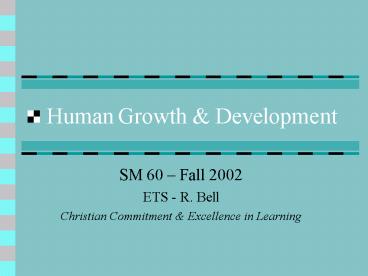Human Growth - PowerPoint PPT Presentation
1 / 19
Title:
Human Growth
Description:
Seven Significant Counseling Decision Points within 3 Phases of Counseling ... Genetic Endowment. Environmental Forces. Developmental History ... – PowerPoint PPT presentation
Number of Views:51
Avg rating:3.0/5.0
Title: Human Growth
1
Human Growth Development
- SM 60 Fall 2002
- ETS - R. Bell
- Christian Commitment Excellence in Learning
2
Seven Significant Counseling Decision Points
within 3 Phases of Counseling
- Phase I Identifying the Nature of the Problem
- Problem Incidence
- Correlated Problems
- Typical Symptom Clusters
- Causal Variables
- Genetic Endowment
- Environmental Forces
- Developmental History
- Predictions about Counselees Future
- Societal Expectations Pressures
3
Phase II Adopting Suitable Counseling Techniques
- An appropriate counseling approach
- Logical Analysis
- Normative data re techniques success in the
past - Progress of the Case
- Counselee cooperation
- Counselee testimony
- Adjustment inventories
- Abatement of symptoms
- Assessment of long-term outcomes
- Evaluating the solution to the counselees
problem longtitudinal outcome
4
Phase III Completing the Counseling Process
- Terminating Counseling
- How?
- Why?
- By Whom?
5
Kail/Cavanaugh
- Chapter 1
- The Study of Human Development
6
What is Lifespan Development?
- The multidisciplinary study of
- how people change and how
- they remain the same over time.
7
Periods of Development
- Newborn (birth to 1 month)
- Infant (1 month to 1 year)
- Toddler (1 to 2 years)
- Preschooler (2 to 6 years)
- School-age child (6 to 12 years)
- Adolescent (12 to 20 years)
- Young adult (20 to 40 years)
- Middle-aged adult (40 to 60 years)
- Young-old adult (60 to 80 years)
- Old-old adult (80 years and beyond)
8
Recurring Issues
- Nature vs. Nurture
- Continuity vs. Discontinuity
- Universal vs. Context-Specific
9
Forces in Human Development
- Biological Forces
- normative age-graded influences
- normative history-graded influences
- non-normative influences
- Psychological Forces
- Sociocultural Forces
- Life-cycle Forces
10
Life Cyle Forces
11
What is a Theory?
- an organized set of ideas that is designed to
explain development
12
Two Major Approaches to Research
- Empirical (Experimental)
- Reductionistic one objective approach
- Hypothesis testing
- Seeks to prove/disprove
- Naturalistic
- Holistic multiple subjective approaches
- Hypothesis generating
- Seeks to explain or interpret
13
Measurement Tools and Issues
- Systematic Observation
- naturalistic or structured
- Sampling Behavior
- Self Reports
- Reliability and Validity Issues
- Representative Sampling
14
Experimental Studies
- Manipulate the key factor you think is causing a
particular variable - Independent Variable
- Dependent Variable
- IV (cause) gtgtgt DV (effect)
- Those who listen to music while studying perform
poorly on tests.
15
Steps in an Experiment
16
Developmental Designs
- Longitudinal Design
- Cross-sectional Design
- Sequential Design
17
Longitudinal vs. Cross-sectional
18
Naturalistic Design
- Observation to achieve a thick understanding of
the phenomenon - thick multi-level
- Flexible design
- What are the primary adjustments to living in a
nursing home? - What factors determine an easy adjustment?
19
Ethical Research Practices
- Minimize risk to participants
- Informed consent
- Avoid deception
- Results should be confidential































